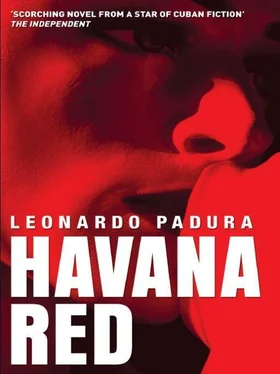Leonardo Padura - Havana Red
Здесь есть возможность читать онлайн «Leonardo Padura - Havana Red» весь текст электронной книги совершенно бесплатно (целиком полную версию без сокращений). В некоторых случаях можно слушать аудио, скачать через торрент в формате fb2 и присутствует краткое содержание. Жанр: Полицейский детектив, на английском языке. Описание произведения, (предисловие) а так же отзывы посетителей доступны на портале библиотеки ЛибКат.
- Название:Havana Red
- Автор:
- Жанр:
- Год:неизвестен
- ISBN:нет данных
- Рейтинг книги:3 / 5. Голосов: 1
-
Избранное:Добавить в избранное
- Отзывы:
-
Ваша оценка:
- 60
- 1
- 2
- 3
- 4
- 5
Havana Red: краткое содержание, описание и аннотация
Предлагаем к чтению аннотацию, описание, краткое содержание или предисловие (зависит от того, что написал сам автор книги «Havana Red»). Если вы не нашли необходимую информацию о книге — напишите в комментариях, мы постараемся отыскать её.
Havana Red — читать онлайн бесплатно полную книгу (весь текст) целиком
Ниже представлен текст книги, разбитый по страницам. Система сохранения места последней прочитанной страницы, позволяет с удобством читать онлайн бесплатно книгу «Havana Red», без необходимости каждый раз заново искать на чём Вы остановились. Поставьте закладку, и сможете в любой момент перейти на страницу, на которой закончили чтение.
Интервал:
Закладка:
“Well, I’m all ears.”
“What do you know about what happened to Alexis Arayan?”
“Poor… That they killed him in the Havana Woods.”
“And how did you find out?”
“I got a call this morning. A friend got wind.”
“Which friend?”
“One who lives round there and saw all the bother. He enquired, found out and phoned me.”
“But who is he?”
Alberto Marques sighed ostentatiously, blinked a bit more, but kept his hands on the arms of the chair.
“Dionisio Carmona is his name, if you must know. Are you happy now?” And tried to make it evident he found the revelation troubling.
The Count thought of asking permission, but decided not to. If Alberto Marques could be ironic, he, Conde, could be rude. How dare that pansy try it on with him, a policeman? He lit his cigarette and puffed the smoke in the direction of his interlocutor.
“You may drop your ash on the floor, Mr Policeman.”
“Lieutenant Mario Conde.”
“You may drop your ash on the floor, Mr Policeman Lieutenant Mario Conde,” the man said, and the Count demurred. You’ll get it from me, you wanking pansy, he thought.
“And what else do you know?”
Alberto Marques shrugged his shoulders, as he shut his eyes and released another sonorous sigh.
“Well… that he was strung up. Ah, my God, the poor dearie.”
Perhaps the man was really upset, thought the Count, before going on the offensive.
“No, technically, he was strangled. His neck was pressed tight till the oxygen was cut off. With a red silk sash. And you know he was dressed like a woman, all in red, with a shawl and the whole works?”
Alberto Marques had let go of the chair arms and his right hand rubbed his face from cheek to chin. Touche, concluded the Count.
“Dressed like a woman? In a red dress? One as long as an old bathrobe?”
“Yes,” replied the Count, “what can you tell me about that? Because I already know it was this house he left yesterday.”
“Yes, he left here at about seven, but I swear I saw him just before and he wasn’t dressed like Electra Garrigo.”
The feast in Paris is never over, and everyone who has lived there retains distinct memories… And it’s so true, though Hemingway said it first, and he was the century’s most egocentric, narcissistic writer. My memories of Paris are a nostalgia in blue I’ve not managed to throw off in twenty years. Because when I arrived in Paris, in April 1969, a painfully beautiful spring had just begun and it made you want to do something to be happier, if happiness exists, to be more intelligent and all-encompassing, or be freer, if freedom exists, or could ever exist. And I remember feeling the magic of an affectionate, almost velvety sun bathing the Champs-Elysees, the grand Napoleonic palaces, the frivolous cafes, and I better understood what had happened the year before. I still feel the afternoon light on the rose-window of Notre-Dame’s facade like a caress on my skin, and hear the dark, historic sound of the Seine by the Cite, and that black organ-grinder in front of the Louvre making his little African monkey dance to the tune of a Viennese waltz. I also remember the Rolling Stones concert when they tried to out-rebel the Beatles, and they were only two hundred yards away from me, under a cold sky of a Paris spring, among shrieking, liberated French blondes, daughters who’d aborted and mothers newly born of the revolution that might have been and was not, although after that month of May the world would never be the same again, because the revolution had been made: the revolution in customs and morality, the twentieth-century’s permanent revolution that Lev Davidovich Bronstein, alias Leon Trotsky, never imagined. I remember each day, each minute, each conversation with Jean-Paul Sartre and the inevitable Simone de Beauvoir, dinners with George Plimpton while he interviewed me for the Paris Review, researching the life, sensitive madness and papers of Antonin Artaud for an edition under contract of The Theatre and Its Double, the nostalgia I acquired upon the death of a Camus whom I never met yet always knew so well, the re-encounter, guided by the eyes and footsteps of Nestor Almendros, with the real sets of so much French cinema, and the pursuit, on the arm of my friend Cortazar, of the archaeological sites of pre-war jazz, cherished in bars like miraculous grottoes… I remember it all because it would be my last trip to Paris, if not my last tango, and memory anticipated history and sage memory knowingly manufactured its own self-defence and tucked away each happy moment of my last trip to Paris as if it knew it would be my last.
That’s why I also remember that day of multiple coincidences charged with encouraging magnetic attractions, when Muscles, the Other Boy and I floated over to Montparnasse on the last sigh of the afternoon, in search of a Greek restaurant that just had to be called the Odyssey, and was renowned for its mountain goat. We were enjoying our leisure and freedom, advanced arm in arm, an invincible army, when Muscles saw him, or rather her, to be more exact. She was a tall, engagingly elegant woman, as prepossessing as the owner of Edith Piaf’s voice, if Edith hadn’t been a mere alcoholic sparrow: a woman who towered alarmingly, projected her breasts pugnaciously and sported a metallic flower of a mouth. I felt her pride tingle my skin: she was dressed in red, strident and so serene, and I found her image bore the tragic dignity which I’d recurrently seen in Electra: she was a revelation, or premonition, dressed in red.
“She’s a transvestite,” Muscles piped up.
And I (and the Other Boy as well, whose name I must not and do not want to recall, for it would be politically and ideologically gauche to reveal his old friendship with Muscles and myself, in that phantasmagoric Paris where everything was possible, even walking the streets with him) felt like a pillar of salt: petrified and speechless.
“My God, how can it be?” asked the Other, even allowing himself a mention of God in Paris, that distant bastion of liberty, when in his Havana conversations he would publicly defend historical, dialectical materialist ideology and his conviction that religion was the opium, marijuana, if not the Marlboro of the people…
“She’s perfection,” I said, for I already knew about pushy Parisian transvestites who went into the street to mingle and exhibit themselves, but I’d never imagined such a spectacle: that woman could have bowled any man over because she was more perfect than any woman, I’d almost go as far as to say she was Woman incarnate, and in fact I did.
“No, a transves tite doesn’t imitate women,” Muscles commented, as if dictating a lecture, with that know-all voice and way with words of his. He always used long, spiralling baroque sentences, as if caricaturing our poor paradisiacal Fat Lezama. As far as he was concerned, a la limite there is no woman, because he knows (and his greatest tragedy is this knowledge he can never cast off) that he, that’s to say, she, is an appearance, her fetishistic realm and power concealing an irredeemable defect created by an otherwise wise nature …
And he explained to us that the transves tite ’s cosmetic erection (Muscles always gave it the emphasis transves tite), the resplendent aggression of her metallic eyelids trembling like the wings of voracious insects, her voice displaced as if it belonged to someone else, a constant voice-over, the imitation mouth drawn over her hidden mouth, and her own sex, ever more castrated, ever more present, is entirely appearance, a perfect theatrical masquerade, he said, and looked at me, as if he must look at me, as if he had no choice.
It was when he uttered the word appearance that I understood everything, that my discovery rushed like iron filings to his magnet and I swung round in alarm to look for the transvestite. But she’d already disappeared into Paris’s magical penumbra, like a fleeting sparkler… An appearance. A masquerade. That had always been the very essence of performance, ever since ritual dances were transformed into theatre, when awareness of artistic creation was born: the transvestite as artist enacting herself… But she was no longer there, and I beheld the Other Boy, in an epiphany, refusing to budge, smitten by that possibility of what he’d always longed to be – or do – and never dared…
Читать дальшеИнтервал:
Закладка:
Похожие книги на «Havana Red»
Представляем Вашему вниманию похожие книги на «Havana Red» списком для выбора. Мы отобрали схожую по названию и смыслу литературу в надежде предоставить читателям больше вариантов отыскать новые, интересные, ещё непрочитанные произведения.
Обсуждение, отзывы о книге «Havana Red» и просто собственные мнения читателей. Оставьте ваши комментарии, напишите, что Вы думаете о произведении, его смысле или главных героях. Укажите что конкретно понравилось, а что нет, и почему Вы так считаете.











